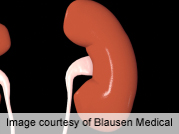- Recognizing the Signs of Hypothyroidism
- 10 Strategies to Overcome Insomnia
- Could Artificial Sweeteners Be Aging the Brain Faster?
- Techniques for Soothing Your Nervous System
- Does the Water in Your House Smell Funny? Here’s Why
- Can a Daily Dose of Apple Cider Vinegar Actually Aid Weight Loss?
- 6 Health Beverages That Can Actually Spike Your Blood Sugar
- Treatment Options for Social Anxiety Disorder
- Understanding the Connection Between Anxiety and Depression
- How Daily Prunes Can Influence Cholesterol and Inflammation
Kidney Damage a Risk of Some Childhood Cancer Treatments, Finds Study


TUESDAY, Sept. 24Some adult survivors of childhood cancer are at increased risk for kidney problems, a new study says.
The study included more than 1,100 adults, aged 18 and older, who were followed for five to 42 years after being diagnosed and treated for childhood cancer.
The researchers examined the long-term effects of kidney-damaging treatments, including the chemotherapy drugs ifosfamide, cisplatin, carboplatin, high-dose methotrexate and high-dose cyclophosphamide; radiation therapy to the kidney region; and partial or complete surgical removal of the kidney (nephrectomy).
Compared with patients who did not receive kidney-damaging treatments, those who were treated with ifosfamide or cisplatin and those who underwent nephrectomy had poorer kidney function, which persisted throughout the follow-up period.
The researchers also found that patients treated with high doses of cisplatin had the highest rate of kidney function deterioration, according to the study published Sept. 24 in the journal Cancer Epidemiology, Biomarkers & Prevention.
The findings suggest that kidney function declines in the early years after certain types of treatment for childhood cancer and does not recover. As kidney function continues to deteriorate, these patients are at increased risk for kidney failure, the study authors explained in a news release from the American Association for Cancer Research.
“Health care providers and survivors should be aware of the increased risk of early kidney damage after [kidney-damaging] treatment for childhood cancer, because these patients are also at increased risk for developing comorbidities, such as cardiovascular disease,” Renee Mulder, a research associate in the department of pediatric oncology at Emma Children’s Hospital/Academic Medical Center in Amsterdam, the Netherlands, said in the news release.
More information
The U.S. National Cancer Institute has more about late effects of treatment for childhood cancers.
Source: HealthDay
Copyright © 2026 HealthDay. All rights reserved.










